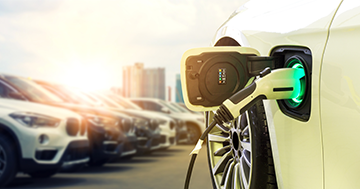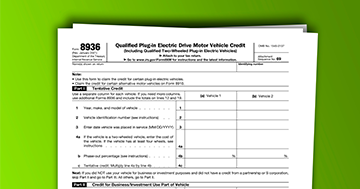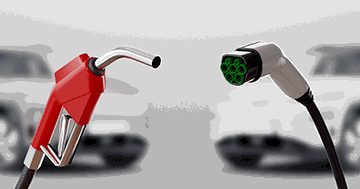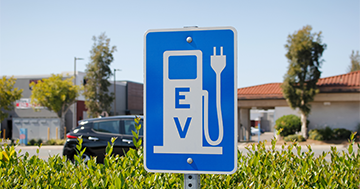1 Source: Tested: Best EV Chargers for 2024 (caranddriver.com)
2 Source: JD Power webinar, August 2023
Electricity Plans for Your EV
The cost to generate electricity at night is lower and also when many people tend to charge their electric vehicle.
With our EV plans, you can take advantage of those lower costs. Now available in Houston and Dallas. To be notified when EV electricity plans are available in your area, click the button below to join our waitlist.
EV Owner 101
- Electric Vehicle (EV) Facts
- EV Charging Facts
Beyond the initial sticker price, owning an Electric Vehicle (EV) offers numerous cost-saving advantages. Potential tax incentives, lower maintenance expenses, and specialized EV electricity rate plans all contribute to reducing long-term costs. Charging an EV is often cheaper than refueling a traditional vehicle with gas, with evolving electricity rate structures continuously enhancing affordability and sustainability.
Source: KBB
Electric vehicles typically require less maintenance than their gas-powered counterparts and plug-in hybrids. This reduced need for upkeep stems from the fewer moving parts in an electric motor compared to a combustion engine, which means less wear and tear over time. Additionally, EVs don't require oil changes, fuel filters, spark plugs, or emission checks, which are common maintenance items for gasoline vehicles.
Source: energy.gov
EV batteries are designed to last between 10 and 20 years, with the exact lifespan influenced by your driving habits and how well you maintain the vehicle. All automakers offer a minimum 8-year, 100,000-mile warranty on battery packs, with some extending the warranty up to 150,000 miles. With attentive care, it's possible to exceed the mileage covered by the warranty. Remember, the longevity of your battery will also depend on the specific model of your vehicle and the environmental conditions you often encounter.
Sources: US News & World Report, Car and Driver
The charging efficiency varies depending on the type of charger you use. A Level 1 charger will typically add about 5 miles of range per hour of charging. On the other hand, a Level 2 charger can significantly boost this rate to approximately 40 miles per hour, allowing for quicker and more efficient charging.
The distance you can travel on a single charge largely depends on your vehicle's battery size and your driving habits. Most EVs are equipped with batteries that can satisfy the daily travel needs of over 85% of American drivers. For those with a battery range of 250 miles or more, nearly all charging can be done at home, with only about six visits to a DC fast-charging station required annually.
Sources: EPA, Consumer Reports
Charging stations are readily available in public locations, and links to these can often be found through various online resources. You can find public charging stations here. Additionally, many EV owners find it convenient and cost-effective to install a charger at home, enhancing their charging accessibility. You can arrange for home charger installation through professional services that offer detailed guidance and support.
Your existing 110–120V AC outlet can be used to charge your EV, though it will charge at a slower rate of about 5 miles per hour. For a faster charging experience, approximately 40 miles per hour, you might consider installing a Level 2 charger. It's advisable to consult a licensed electrician to determine if your electric panel requires any modifications to accommodate this.
Source: HelloTech
EV chargers are versatile and can be installed either inside or outside of a garage. Most home chargers are designed to be weather-resistant, ensuring they can operate effectively outdoors. To further enhance safety and reliability, consider adopting an EV electrical protection plan tailored for your installation.
Use a smart charging app or vehicle infotainment system: Most EV manufacturers and/or charger manufacturers provide mobile apps or in-vehicle infotainment systems that allow you to schedule charging sessions. In the app or system, look for options like "Schedule Charging," "Departure Times," or "Charging Times."
Set charging times: You can typically set a start and end time for when you want the charging session to occur. For example, you could schedule charging to start at 11 PM and end at 6 AM* to take advantage of off-peak electricity rates.
*align with your utility or electricity rate plan off peak hours
Customize weekly schedules: Some apps and systems allow you to set different charging schedules for each day of the week to align with your routine.
This way, you can have different schedules for weekdays versus weekends.
Source: EV.Energy
Battery charging best practices: Follow the 20-80% rule: Keep the battery charged between 20-80% state of charge (SoC) as much as possible. This "green zone" helps improve battery life. Avoid full charge (100% SoC): Minimize the time the battery spends at 100% charge, as extremely high states of charge can stress the battery. Unplug once it reaches 80% or set a partial charge limit. Don't let it go to 0%: Avoid letting the battery completely drain to 0% SoC, as extremely low states of charge also degrade the battery faster.
Use optimal charging profiles: Utilize charging profiles or schedules that optimize the charging rate and pattern for your specific battery chemistry, maximizing lifespan.
Precondition the battery: Some EVs allow preconditioning the battery to an optimal temperature before charging, improving efficiency.
Temperature management: Avoid extreme temperatures: High temperatures accelerate battery degradation, while low temperatures can damage the battery when charging. Park in shade/use cooling: In hot weather, park in the shade and keep the EV plugged in to allow the battery cooling system to run. Use battery heating: In cold weather, plug in the EV to allow the battery heating system to run on grid power.
General battery care: Follow manufacturer guidance: Check your EV's owner's manual for the manufacturer's specific recommendations on optimal charging, operating temperatures, and battery repair/replacement. Use battery management systems: Leverage the EV's battery management system or cloud-based services to optimize charging profiles and monitor battery health.
Sources: Black Ridge Research, Xcelerate, Univeristy of Michigan, Bosch
Factors That Affect Range:
The Car Itself: Tire pressure, tire condition, vehicle weight, and use of accessories such as climate control, infotainment, etc. all affect range to varying degrees. The same goes for extra weight such as pulling a trailer, or a loaded roof box will reduce your range like it would in a combustion engine gas powered vehicle.
Weather and Road Conditions: Extreme temperatures (hot or cold), windy conditions, hilly or mountainous terrain, and road surface conditions can have an impact the range. Preheating the car while it’s being charged can effectively increase range in cold or hot weather.
Driving Habits: Aggressive acceleration, rapid speed changes, high speed driving, towing can all decrease the range of your EV. A calmer approach behind the wheel will get you those desired extra miles and extend the range.
How to Extend the Range:
Plan Your Charge: Use apps or in-vehicle navigation to locate charging stations along your route and plan charging stops accordingly.
Pre-Heat or Pre-Cool: Use the pre-conditioning feature to heat or cool the cabin while still plugged in, reducing battery drain during driving.
Manage Your Speed: Maintain a consistent, moderate speed to maximize efficiency and range.
Select Eco Climate Settings: Use the vehicle's eco or range mode to optimize climate control and other systems for maximum range.
Plug In More Often When Cold: In cold weather, plug in the vehicle whenever possible to allow the battery to warm up and maintain optimal temperature.
Understanding Range:
EPA Range: The Environmental Protection Agency (EPA) provides an estimated range for EVs based on standardized testing procedures. This range is a useful reference but may not reflect real-world driving conditions. To make the numbers easier to understand, the EPA provides a miles-per-gallon equivalent measurement (MPGe) to offer a comparison to gas powered vehicle estimates.
Real-World Range: The actual range of an EV can vary significantly from the EPA estimate due to factors like driving habits, weather conditions, and terrain. Real-world range is typically lower than the EPA estimate. These factors change across different circumstances, which means that the real-world range will also change.
Maximizing Real-World Range:
The following measures will have a positive impact on your real-life range.
- Follow the manufacturer's recommendations for optimal battery care and charging practices.
- Adopt eco-friendly driving habits, such as gradual acceleration and braking, and maintaining a moderate speed.
- Use the vehicle's range-maximizing features, such as eco mode and regenerative braking.
- Plan routes and charging stops in advance, taking into account factors like weather, terrain, and traffic conditions.
- Monitor the vehicle's range display and adjust driving habits or make charging stops as needed.
Sources: EVBox, Samsara, PodPoint, EV Charging Solutions
For residential use, a Level 2 charger is the most common and efficient option. It can be installed in two ways:
- Hardwire Charger Installation: A hardwired charger is directly connected to your home's electrical wiring or a junction box, requiring professional installation by an electrician. Constellation Home prefers hardwired EV charger installations for their enhanced safety, reliability, and higher charging speeds, ensuring a seamless integration into your home’s electrical system. This method offers a durable, weather-resistant solution and complies with local building codes.
- Plug Charger Installation: This type uses a NEMA (240 Volt) plug connected to a cable (10-25 feet long) that plugs into a corresponding outlet. If your home already has a compatible NEMA outlet, you can directly plug in your charger. Otherwise, a qualified electrician can install the necessary outlet. Adapters are also available for different NEMA socket types. Constellation recommends a hardwired installation for a safer, more reliable, and efficient charging experience, ensuring your home’s infrastructure is adequately prepared for the demands of electric vehicle charging.
Other types of EV Chargers include:
- Level 1 Chargers: Level 1 charging, utilizing a standard 120V household outlet, offers an accessible method of EV charging. However, its slower charging rate—typically delivering about 4-5 miles of range per hour—may not be adequate for drivers who frequently cover more than minimal distances. For those with regular or extensive driving needs, this charging option may prove less practical.
- Level 3 “DC Fast Chargers”: While extremely efficient at charging EVs quickly, Level 3 chargers are not suitable for home installation. These chargers require a direct current (DC) supply, whereas residential settings typically only support alternating current (AC). Additionally, the high power requirement and infrastructure changes necessary for DC fast charging are impractical and economically unfeasible for typical home use.
For more information on EV Chargers available through Constellation Home (or their authorized service providers) as well as scheduling installation, click here.
Constellation Home offers a seamless process for bringing EV charging to your home. After completing the digital enrollment process to purchase your EV Charger and schedule your installation, customers can expect the following:
Preparation: Prior to arrival, your technician will have reviewed photos of your electrical panel and the planned charger. High-quality photos streamline the preparation process for your technician, ensuring a smooth and efficient installation experience. Expect to exchange photos and information with the technician, possibly including better photos or Google Maps references.
Wire Assessment: The amount of wire needed will be estimated based on the distance between the electrical panel and the charger location. We may need to revise your installation cost if: (1) the information you provide is incomplete or untrue; or (2) the cost to install the EV charger in your home exceeds our Ordinary Costs. “Ordinary Costs” for installing an EV charger includes labor and material to install (in accordance with local code requirements) one 240V dedicated circuit and mount for the Level 2 charger you purchased. Please review your Installation Contract for full details.
Ordinary Costs do not include the following: wiring exceeding 100 feet in length; utility service or panel upgrades; load management devices; any trenching or landscaping work; repair of drywall, stucco, plaster, concrete or any repairs to walls, ceilings or floors due to installation of wiring. A new work order and pricing may be needed if additional work is required to install the EV charger.
Installation: On the day of installation, the technician will do a walkthrough with you regarding installation details, including wire path, panel modifications, and whether drywall cutting is needed. The technician will proceed with the installation. Once the installation is successfully finished and the charger is fully operational, the remaining balance for the services will be due.
Final Steps: Once installed, you should learn how to operate the breaker, test the charger with your vehicle, and understand the process for the subsequent inspection. The homeowner typically handles the setup of accounts or associated applications for the charger and having all accounts – specifically username and passwords - created in advance can significantly streamline any desired testing once installation is complete.





